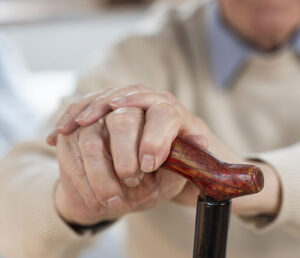The Illinois Dead Man’s Act can be a powerful evidentiary rule that may have a huge impact on how a particular case unfolds.
Requirements for Incompetency:
Three requirements must be met to render a witness incompetent under the dead man’s act:
- The witness must be an adverse party or person directly interested in the action;
- (S)he must seek to testify in his/her own behalf;
- An adverse party suing or defending as a representative of a deceased or person under a legal disability is protected as to any conversation with the deceased or person under legal disability and as to any event taking place in such person’s presence.
With regard to the first requirement, the test is whether the witness will gain or lose as a direct result of the litigation. Brownlie v. Brownlie, 351 Ill. 72, 183 N.E. 613 (1932). Interested parties have been held to include shareholders of a corporation, members of benefit associations, beneficiaries of a fund in action to recover a pledge, the spouse of a party that bears an interest, all parties to will contests, and etc. Interested parties have traditionally NOT included prospective heirs of a party or interested person. Ackman v. Poter, 239 Ill. 578, 88 N.E. 231 (1909).
With regard to the third requirement an event is a happening or occurrence and also includes the non-happening or non-occurrence of an event. Gunn v. Sobucki, 216 Ill.2d 602, 837 N.E. 2d. 865 (2005). Also the party suing or defending must be suing or defending as a “representative” rather than in her own right. Representative means “any executor, administrator, heir or legatee of a deceased person and any guardian or trustee of any such heir or legatee, or a guardian or guardian ad litem for a person under legal disability.” 735 ILCS 5/8-201(b)
Exceptions
There are three exceptions to this act which would allow an otherwise incompetent witness to testify:
- If the representative of the deceased person or person under legal disability “opens the door” “by presenting testimony, either by live or by deposition, concerning the conversation or event.” Illinois Bar Journal, by William T. Gibbs, “A Quick Guide to the Illinois Dead Man’s Act,” Vol. 96 #7, July 2008. The taking of a deposition of an adverse party or interested person by the representative does not itself make such person competent; only the calling of a witness or the introduction of the deposition at trial constitutes waiver. Pink v. Dempsey, 350 Ill.App. 405, 113 N.E.2d 334 (1953).
- When the testimony is only being offered as foundation for books, records, documents and etc.
- “No person shall be barred from testifying as to any fact relating to the heirship of a decedent.” 735 ILCS 5/8-201(d).
The third exception was added in 1973 and the following progression of case law helps to get a better understanding of this amendment.
Interpretting the Case Law: (Before and After the 1973 Amendment)
In 1973, an amendment was made adding the third exception listed above, namely “No person shall be barred from testifying as to any fact relating to the heirship of a decedent.” 735 ILCS 5/8-201(d).
Before the 1973 amendment, the courts generally applied the dead man’s act such that, “if controversy did not exist as to the persons who were to share but only as to the amount of the shares, no one could invoke the statute.” See Pigg v. Carroll, 89 Ill. 205 (1878). “If, however, controversy existed as to the persons who were to share, the statute could be invoked.” See In re Estate of Maher, 210 Ill. 160, 71 N.E. 438 (1904). Graham’s Handbook of Illinois Evidence, 10th Ed., Section 601.14, p. 415 (2010).
In In re Estate of Maher, the Supreme Court invoked the Dead Man’s Act and held that “a woman claiming to be the lawful widow of a dead man, whose claim in that regard is denied by others who have interests, or assert interests, as heirs, in his estate, is incompetent to testify to the fact of her marriage in a proceeding in which she seeks, as distributee, a portion or all of his personal property, until her status as such widow has been conceded or has been established by the adjudication of a court having jurisdiction of the subject.” 210 Ill. 160, 170; 71 N.E. 438, 442 (1904).
Graham’s Handbook of Illinois Evidence states, “while the impact of 5/8-201(d) [the exception for heirships] has yet to be fully interpreted, the exception was clearly drafted with the intent of making all witnesses competent to testify as to ‘heriship,’ both where the controversy includes who shall share and in disputes over the amount of the shares.” Graham’s Handbook goes on to cite Matter of Estate of Bailey, and concludes that “no person is barred from testifying in a proceeding to establish the proper administration of an estate.” Section 601.14, p. 415
In In re Estate of Earl J. Bailey v. Velma H. Bailey, 97 Ill.App.3d 781; 423 N.E.2d 488 (5th Dist. 1981), the petitioner, widow, challenged the estates appointment of administrator claiming that she was the decedent’s wife and should properly be the administrator. The Respondent, estate, objected to Petitioner’s testimony concerning her marriage with the decedent citing the Dead Man’s Act. The trial court sustained Respondent’s objection and required Petitioner to establish her heirship through non-interested witnesses. The trial court denied Petitioner’s petition. Id. at 781-782.
The petitioner, widow, appealed the decision of the trial court, and the appellate court found that the trial court erred in barring Petitioner’s testimony concerning her marriage with the decedent. The appellate court found that the Petitioner’s testimony is allowed under section 2(4), namely the 1973 amendment making an exception to the Dead Man’s Act which states, “no man shall be barred from testifying as to any fact relating to the heirship of a decedent.” Id. at 783-784.
The appellate court in Bailey considered the harsh results of the 1896 case of Laurence v. Laurence, in which the Supreme Court found that the trial court erred in allowing the wife to testify as to her marriage with the decedent and reversed the trial court’s ruling. (The Supreme Court found that the wife could not establish the marriage since she was unable to provide independent testimony to establish her marriage). The appellate court in Bailey stated that the “application of the testimonial bar of the Act to situations such as this leads to a race to the court house to be appointed or nominate an administrator. Once the appointment is made, any party wrongfully omitted from the selection must shoulder the onerous burden of proving heirship without the benefit of his own testimony.” Id. at 784.
An article published in the Illinois Bar Journal, by William T. Gibbs, called, A Quick Guide to the Illinois Dead Man’s Act, discusses the 1973 heirship exception in more detail. Both Graham’s Handbook, and William Gibb’s article hold The Matter of Estate of Bailey out as the authoritative case to support the conclusion that “no person will be barred from testifying in a proceeding to establish the proper administration of an estate.” Illinois Bar Journal, Vol. 96 #7, July 2008.
Conclusion:
Having placed the case law into two categories (those cases filed before the 1973 amendment and those cases filed after the 1973 amendment), it becomes much easier to reconcile the apparently conflicting rulings on this issue. The Matter of Estate of Bailey is frequently considered the authoritative case which supports the conclusion that “no person will be barred from testifying in a proceeding to establish the proper administration of an estate.”



